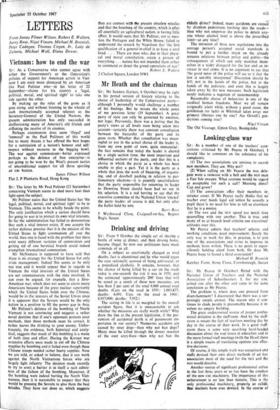Mr Heath and the chairman
Sir: Mr Sanders (Letters, 6 October) may be right in his potted version of history relating to the choice of leadership of the Conservative party— although I personally would challenge a number of his findings. But he misses the whole point of my previous letter (29 September). A great party of state can only be governed by emotion, not logic. Previously, there was a feeling that the party's views at all levels were being taken into account—certainly there was constant consultation between the hierarchy of the party and its grass roots. Whether that consultation was mean- ingful or not in the actual choice of the leader is, from my own point of view, quite immaterial: the fact remains that today the leader is elected by a single section (true, the most important and influential section) of the party, and that this is a choice in which the party as a whole has been unable to play a part. Yet it is the party as a whole that does the work of financing. of organis- ing. and of doorbell pushing in relation to par- liamentary elections—it is patently unsatisfactory that the party responsible for returning its leader to Downing Street should have had no say in his selection. it is a red herring to say that the executive committee of the National Union 'elected' the party leader; of course it did, but only after the ballot held by MPS.
Barry Rose 5 Wychwood Close, Craigweil-on-Sea, Bognor Regis, Sussex


































 Previous page
Previous page